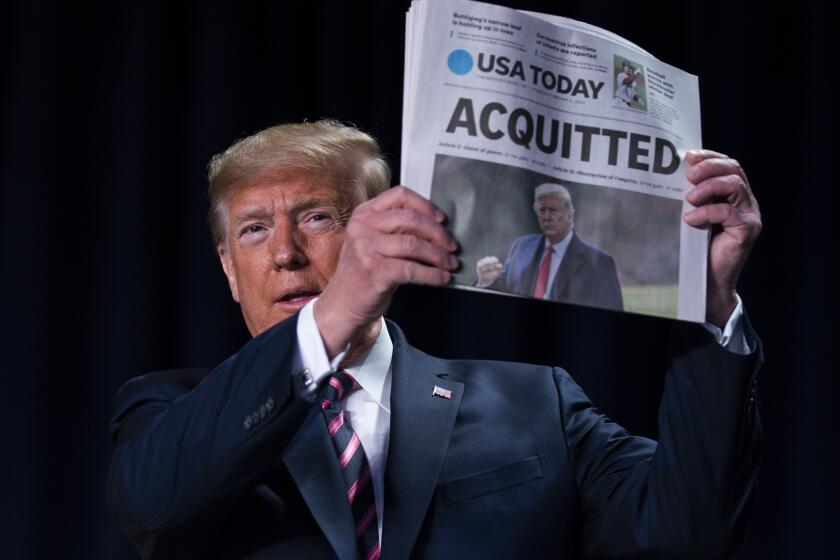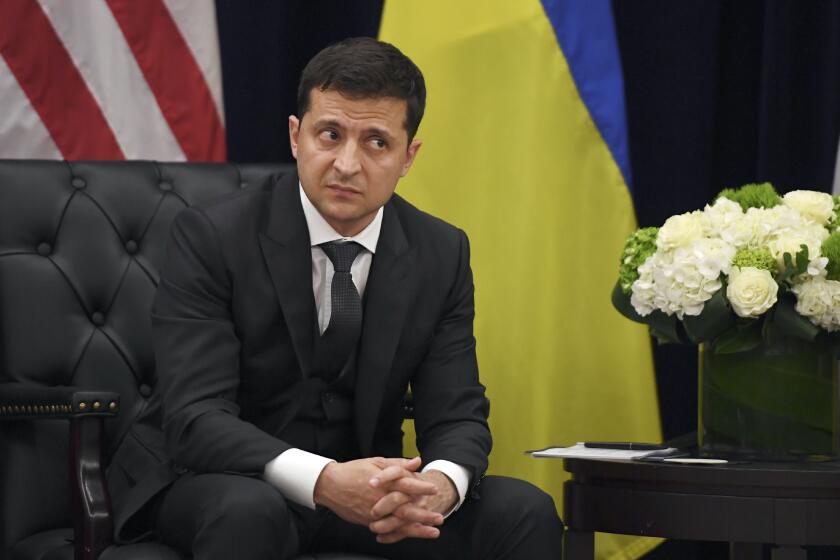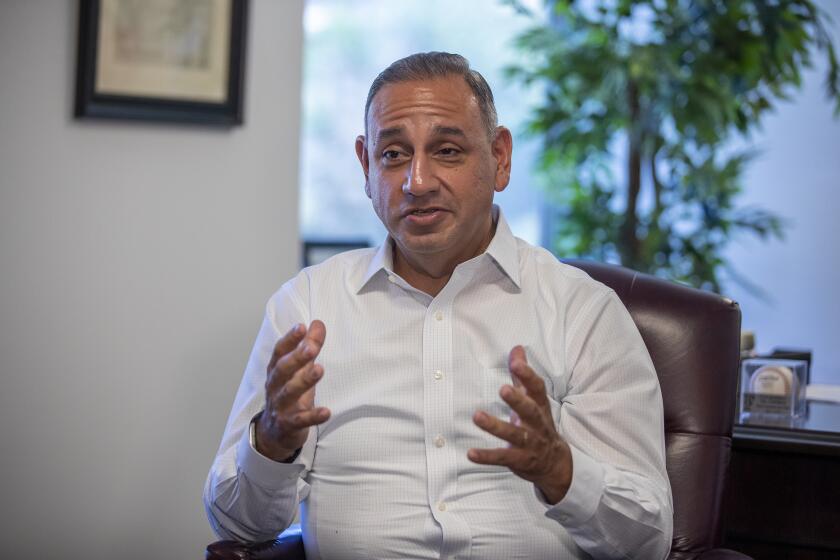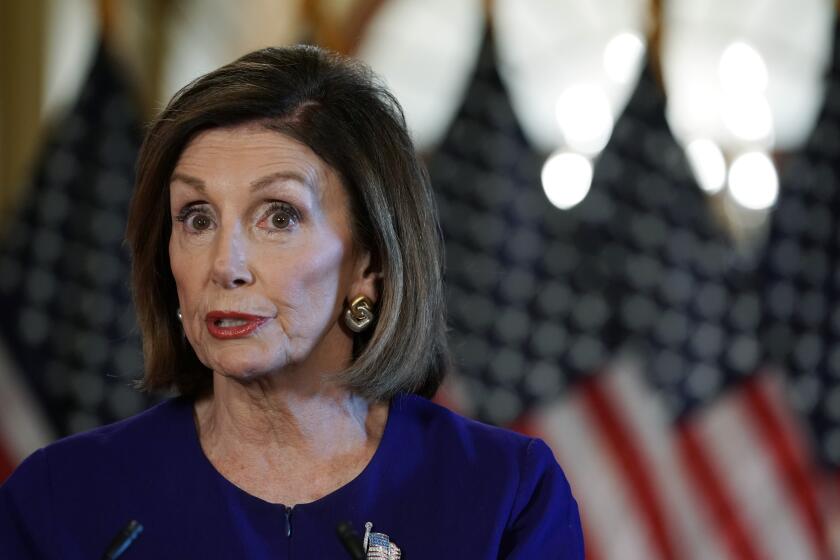Trump asked Ukraine’s leader for a ‘favor’ — help investigating Joe Biden and a California company
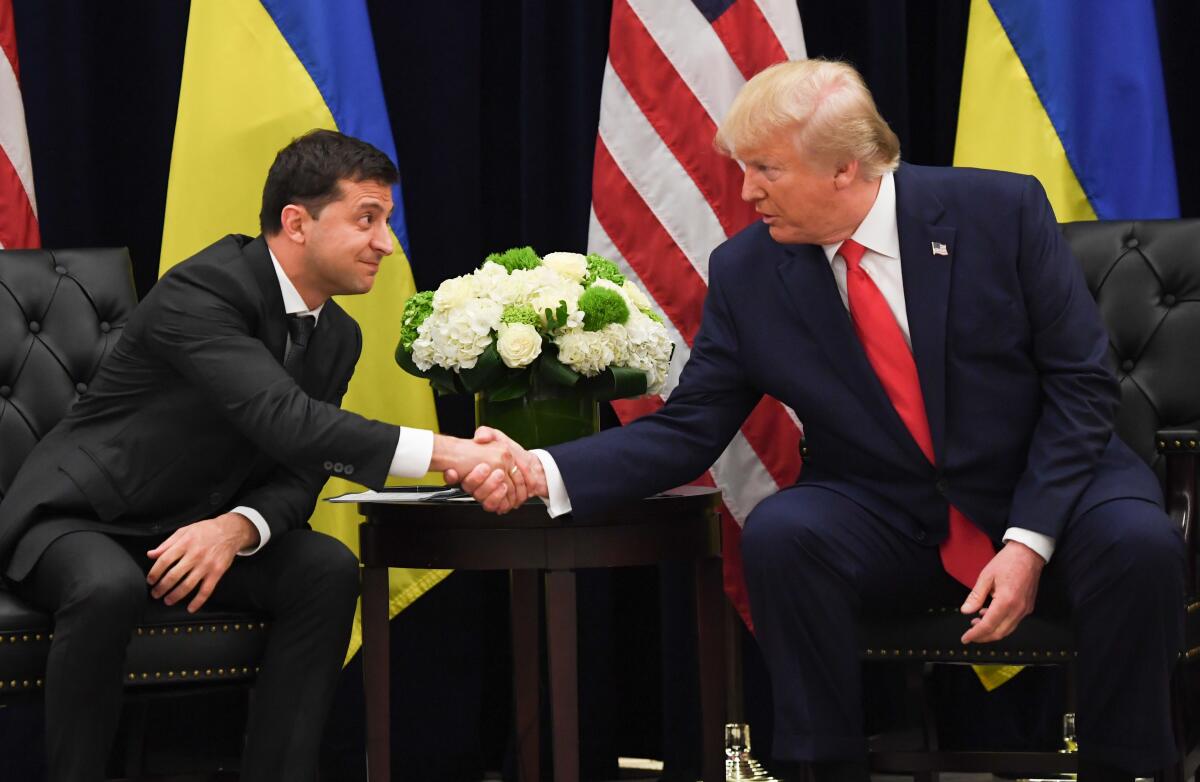
- Share via
WASHINGTON — President Trump directly asked Ukraine’s president for a “favor” while discussing U.S. military aid to the besieged country, according to a White House memo of their July 25 phone call, suggesting a link that could be crucial to the Democrats’ fast-moving impeachment inquiry.
The details emerged as the Justice Department confirmed that the inspector general for the director of national intelligence had made a criminal referral about the call, questioning whether Trump had violated campaign finance law, but that department lawyers had determined he had not.
The House of Representatives intends to vote to impeach President Trump for abusing his office and obstructing Congress, a condemnation that only two other U.S. presidents have faced in the nation’s 243-year history. Despite the historic nature of the vote on charging the president with committing high crimes and misdemeanors, Trump’s fate has been sealed for days, if not weeks in the Democratic-controlled House.
During the 30-minute call, Trump asked Ukrainian President Volodymyr Zelensky both to investigate former Vice President Joe Biden, a potential Democratic opponent in the 2020 election, and to look into CrowdStrike, a cybersecurity firm that did work for the Democrats in the 2016 election. The technology company is based in Irvine, but Trump apparently believed it operated from Ukraine.
Trump asked Zelensky at least five separate times on the call to work with Atty. Gen. William Barr, putting the nation’s highest law enforcement official directly in the House inquiry into whether Trump abused his powers and jeopardized national security by pushing a foreign government to dig up dirt on a U.S. presidential candidate.
“Whatever you can do with the attorney general would be great,” Trump told Zelensky after mentioning Biden several times. The Justice Department said Wednesday that Barr was unaware of Trump’s request at the time and that he did not have any contact with Ukrainian officials about the president’s request for an investigation into Biden.
Trump also urged Zelensky several times to speak to Rudolph W. Giuliani, Trump’s personal attorney. Although he is a private citizen, Giuliani has led the president’s efforts to get Ukraine to investigate Biden and his son Hunter, who sat on the board of a Ukrainian natural gas company.
“I will have Mr. Giuliani give you a call and I am also going to have Atty. Gen. Barr call and we will get to the bottom of it,” Trump said. “I’m sure you will figure it out.”
Caught in President Trump’s impeachment proceedings, Ukraine President Volodymyr Zelensky struggles to stay on his anti-corruption course.
On Wednesday, a day after House Speaker Nancy Pelosi (D-San Francisco) announced the start of a formal House impeachment inquiry, the White House released what it called a non-verbatim transcript, five pages compiled by note takers in the White House Situation Room, of the call between Trump and Zelensky.
“There’s a lot of talk about Biden’s son, that Biden stopped the prosecution and a lot of people want to find out about that so whatever you can do with the attorney general would be great,” Trump said on the call, according to the memo. “Biden went around bragging that he stopped the prosecution — so if you can look into it.... It sounds horrible to me.”
In 2016, Vice President Biden urged Ukraine’s government at the time to fire a prosecutor whom the Obama administration and its European allies deemed soft on corruption. The prosecutor had investigated the energy company that had hired Biden’s son, but that inquiry had already ended by the time the vice president got involved.
No evidence has emerged to show Biden sought to help his son, and neither the former vice president nor his son has been accused of any wrongdoing.
Biden later spoke publicly about withholding U.S. financial support for Ukraine unless the prosecutor was fired, but he did not brag about stopping a prosecution of the company.
In a statement Wednesday, Biden called it “a tragedy for this country that our president put personal politics above his sacred oath” and said the attempt to involve Barr was an “attack on the core independence” of the Justice Department.
What’s an impeachable offense? A president misusing his power to benefit himself.
Trump argued Wednesday that his conversation with Zelensky was portrayed as the “call from hell,” but “it turned out to be a nothing call.”
Trump and Zelensky held an awkward public meeting on the sidelines of the United Nations General Assembly several hours later. Zelensky joked that it was better meeting on television than by phone. He made clear he did not want to be involved in another country’s democratic elections.
“We had, I think, a good phone call,” Zelensky said. “Nobody pushed me.”
Zelensky looked at Trump with apparent shock when Trump urged him to work more closely with Russian President Vladimir Putin, who seized Crimea in 2014 and has backed separatists fighting in eastern Ukraine. Trump also directed blame at former President Obama for Russia’s invasion, leveled more accusations against Biden and rehashed old charges about Hillary Clinton’s emails.
The latest allegations clearly unnerved Trump, who appeared listless and agitated during a rambling 40-minute news conference in the late afternoon in which he took only four questions and suggested to reporters that they also seek records of Vice President Mike Pence’s conversations with Zelensky.
“I thought we won. I thought it was dead,” Trump said, referring to the threat of impeachment that hovered over him during special counsel Robert S. Mueller III’s lengthy investigation over Russian meddling in the 2016 election.
Trump accused Democratic senators of also pressuring Ukraine to help with an investigation, but that situation was different. In May last year, three Democratic senators wrote to the Ukrainian prosecutor general to “express great concern” that he may have stopped cooperating with Mueller.
The call memo shows Trump urged a foreign government to intervene in the 2020 election the morning after Mueller testified in Congress on July 24 about Russian attempts to influence the 2016 election on Trump’s behalf.
Trump acknowledged this week that he held up delivery of nearly $400 million in military and State Department aid that had been approved by a bipartisan vote in Congress to help Ukraine counter aggression from Russia. The aid was finally released this month.
Trump denied that the two-month delay in releasing the aid, which included antitank weapons and crucial communications systems for Ukraine’s embattled military, was meant to pressure Zelensky.
But the record of the call shows he tied the issues together. Zelensky brought up his desire for more U.S. military aid, saying, “We are ready to continue to cooperate for the next steps,” including the purchase of the Javelin antitank missiles to help fight the Russia-backed separatists.
Trump did not reply to the request for military help, asking Zelensky for help instead with the investigations.
“I would like you to do us a favor, though,” he began. He added: “Whatever you can do, it’s very important that you do it if that’s possible.”
Trump also told Zelensky that “the United States has been very good to Ukraine” but complained that it had not been “reciprocal.”
Cisneros and other freshmen with a national security background now support an impeachment inquiry
The White House memo shows that in addition to his interest in the Bidens, Trump was eager to find evidence that could tarnish the special counsel investigation.
“I would like you to find out what happened with this whole situation with Ukraine — they say Crowdstrike.”
Trump has long questioned the origins of the Russia investigation, particularly the original analysis that CrowdStrike made to determine that operatives backed by Moscow hacked Democratic National Committee computer networks.
CrowdStrike did not immediately respond to requests for comment.
Trump’s allies suspect some Ukrainian officials helped the investigation led by Mueller, who prosecuted Trump’s former campaign chairman, Paul Manafort, on charges of bank fraud, tax evasion and other crimes related to his work as a political consultant for the former Russian-backed government in Kyiv. Manafort was convicted and sentenced to 7 1/2 years in prison.
Zelensky appeared eager to win Trump’s favor on the call, telling the president that he has stayed at his New York hotel and that he has adopted his “drain the swamp” slogan as a guiding philosophy.
He assured Trump that an assistant had already spoken with Giuliani “and we are hoping very much that Mr. Giuliani will be able to travel to Ukraine and we will meet once he comes to Ukraine.”
“I just wanted to assure you once again, that you have nobody but friends around us,” Zelensky added.
The impeachment inquiry has focused so far on Trump’s phone call, as well as a whistleblower’s complaint to the Office of the Director of National Intelligence, and the criminal referral to the Justice Department that followed.
Barr’s office, which had supported the Trump administration’s efforts to keep the complaint under wraps, said Wednesday that no crime had been committed. The administration sent the whistleblower complaint to Congress on Wednesday afternoon.
Members of the House and Senate intelligence committees who began reviewing it said it was a 10-to-12-page document that had not been redacted and that only one portion, an annex, was classified. Lawmakers from both parties, while not revealing the contents, said it will prompt them to seek more evidence and interview additional witnesses, including Justice Department officials.
The Ukraine allegations have breathed new life and focus into an impeachment inquiry that even some Democrats feared was at risk of losing momentum.
Rep. Adam B. Schiff (D-Burbank), who heads the House Intelligence Committee, said the White House account of the call portrays “a classic mafia-like shakedown of a foreign leader.”
Pelosi echoed that language, saying the president was using “taxpayer money to shake down other countries for the benefit of his campaign,” she said. “Either the president does not know the weight of his words or he does not care about ethics or his constitutional responsibilities.”
Sen. Mitt Romney (R-Utah) was the only Republican in Congress who expressed serious concern about the phone memo, calling it “deeply troubling.”
“The president of the United States asks or presses the leader of a foreign country to carry out an investigation of a political nature, that’s troubling,” he said at the Atlantic Festival.
Romney — who faced Twitter backlash from the president after he went public with his concern — speculated that few Republicans are willing to speak out against the president because “there’s such enormous power associated with being the party in power.”
Democrats quickly called for Barr to recuse himself from any related investigations given his central role in the president’s phone call.
Barr’s spokeswoman, Kerri Kupec, said the intelligence community’s inspector general had cited the president’s phone call with Zelensky “as a potential violation of federal campaign finance law, while acknowledging that neither the inspector general nor the complainant had firsthand knowledge of the conversation.”
Kupec said the criminal division “reviewed the official record of the call and determined, based on the facts and applicable law, that there was no campaign finance violation and that no further action was warranted.”
The whistleblower’s complaint is believed to go beyond the single phone call to include other actions undertaken by the president.
The latest, and arguably most serious challenge to Trump’s presidency, has moved with remarkable speed. Details of the whistleblower’s complaint were revealed only last week, triggering a wave of new Democratic calls for impeachment proceedings.
The Mueller investigation, by contrast, progressed largely in secrecy over two years, leaving many Democrats, including Pelosi, cautious over initiating an impeachment inquiry.
Trump’s decision to release the White House notes was unusual because such records normally are closely held to protect the confidentiality of presidential conversations with world leaders.
Times staff writers Molly O’Toole, Del Quentin Wilber and Sarah D. Wire in Washington and special correspondent Sergei Loiko in Kyiv contributed to this report.
More to Read
Get the L.A. Times Politics newsletter
Deeply reported insights into legislation, politics and policy from Sacramento, Washington and beyond. In your inbox three times per week.
You may occasionally receive promotional content from the Los Angeles Times.
